New research reveals significant wage gap for Latina workers in Santa Barbara, Santa Cruz and Ventura counties


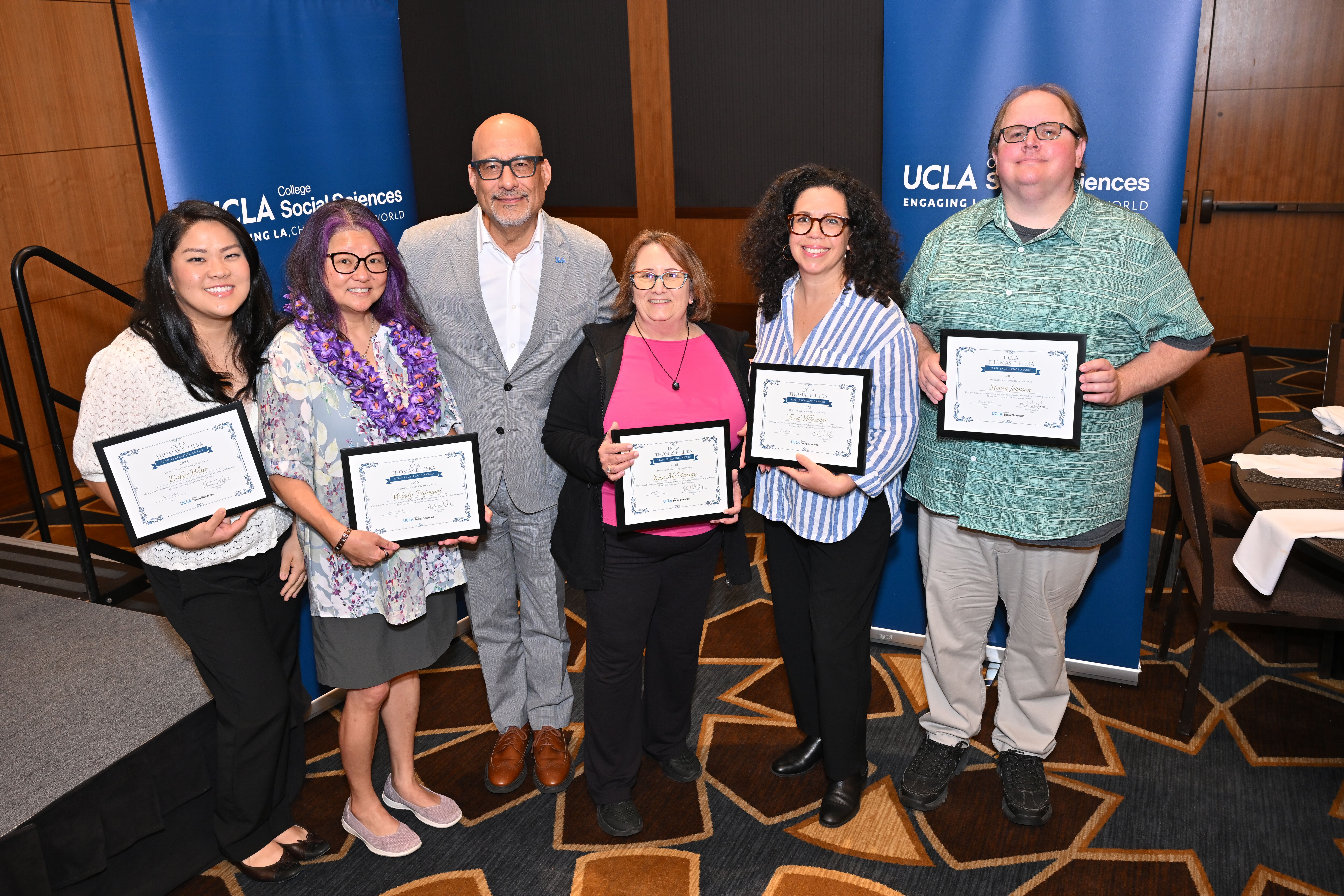
Award winners were honored at an annual celebratory luncheon and ceremony alongside their UCLA Social Science colleagues
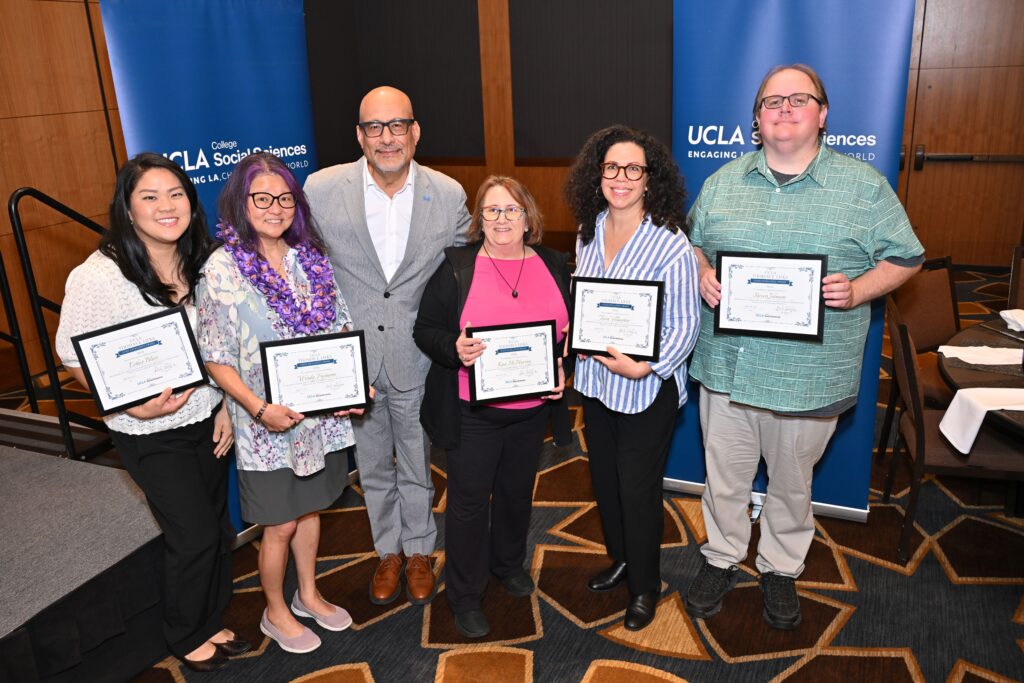
Citlalli Chávez-Nava
Staff from UCLA’s Division of Social Sciences were honored at the second annual Thomas E. Lifka Staff Appreciation Luncheon and Awards Ceremony hosted by Dean Abel Valenzuela Jr. on June 18 at the Luskin Conference Center.
The Thomas E. Lifka Staff Excellence Award —the first award of its kind in the division — recognizes staff who have demonstrated exemplary service during the preceding academic year or have contributed to a career of distinguished service within the division. The accompanying luncheon, open to all divisional staff, brings together colleagues across departments and units to not only honor the current award winners but also to celebrate the annual contributions of all social science staff members.
“I know we do a great job celebrating and uplifting faculty and students in their work, accomplishments and discoveries, yet none of this is possible without you, our staff, ” said Valenzuela in his opening remarks during the ceremony. “Today, I want you to feel celebrated and acknowledged for all that you do, because we could not achieve any of this without your support.”
Named after Thomas E. Lifka, who joined UCLA in 1982 as Assistant Vice Chancellor for Student Academic Services, the award honors his administrative legacy at UCLA. During his 29-year career at UCLA, he oversaw admissions, financial aid, loan services, the registrar’s office, the career center and international student services. A campus leader and proud gay man, Lifka was also an early contributor to UCLA’s efforts to increase enrollment from underserved communities and was also a vocal supporter of the establishment of the LGBTQ+ Resource Center. His ultimate goal was to ensure as wide and diverse an admissions pool as possible.
In 2023, Dean Valenzuela honored Lifka by creating the award and naming him its first recipient. Lifka then partnered with Valenzuela to endow the award bearing his name to recognize non-academic staff in the UCLA Division of Social Sciences at an annual event.
In total, seven staff members received the Thomas E. Lifka Staff Excellence Award at the 2025 ceremony. Below is the list of winners presented in two different categories: Excellence in Administrative Leadership (3 awards) and Excellence in Staff Performance (4 awards). Winners receive either $5000 or $1000 monetary award in the form of a STAR Award.
Thomas E. Lifka Staff Excellence Award – Excellence in Administrative Leadership Nomination
This award honors exceptional Management Services Officers (MSOs) and Chief Administrative Officers (CAOs) within UCLA’s Division of Social Sciences.
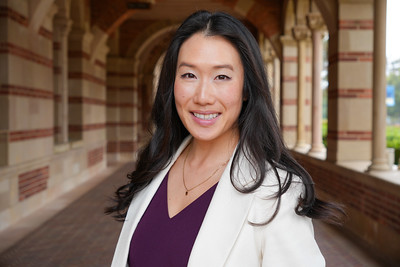
Rosa Chung, Management Services Officer – Center for the Study of Women (CSW) |Streisand Center
Rosa Chung deeply understands the research needs of the CSW|Streisand faculty and finds creative ways to stretch its resources — whether that be funding, time, staff support, space, or its networks. A creative, dedicated leader, she came up with the idea to make the center’s office space open to the campus community for workshops and small events and co-working activities.
Chung also came up with a centerwide holiday book swap that has sparked conversations and connections among her team. During the wildfire emergency, she started a weekly lunchtime gathering where she brings a dish she’s made and staff, students and faculty are invited to eat lunch together and discuss and plan mutual aid activities to support impacted communities. Chung also runs the center’s plot at the UCLA community garden so CSW|Streisand Center can plant and garden together.
“Through her discernment, leadership and deep care, she’s built a team with a level of trust, camaraderie and genuine joy in the work that we do. She insists always that everyone who comes into the center is important, whole — human, and she cultivates that ethos in the entire department. Because of her, our center is a space of joy, fun, safety and community.” – Grace Hong, Director at CSW|Streisand Center
“I am honored to receive the 2025 Thomas E. Lifka Staff Excellence Award. The CSW|Streisand Center community is one of the most brilliant and caring groups of colleagues I’ve ever worked with. They inspire me to do and give my best in support of our mission.” – Rosa Chung
Kasi McMurray, Chief Administrative Officer- Department of Geography
Kasi McMurray is undeniably the driving force behind most departmental activity, serving both as the steward of departmental knowledge and the guide for new projects.
A standout example of her dedication is her department’s key role in the department’s development efforts — well beyond the expectations of her position. McMurrary organizes the annual Von Humboldt Reception and separate dinner events held in conjunction with the Von Humboldt Lecture. In addition, she has been one of the main organizers of the biennial Muir Symposium and dinner. These large-scale events draw over 300 attendees and demand careful, dedicated planning.
McMurray has also been instrumental in the success of the Department’s new Master of Applied Geospatial Information Systems and Technologies (MAGIST) program and GIS certificate program. She has supported faculty in numerous public appearances and helped develop extremely successful workflows for the programs.
“When the students or faculty have problems of all sorts, they go to Kasi. No one ever feels rushed out of her office even though she’s got demands in every moment of every day. She creates an environment where everybody in the department feels like they have a home. I couldn’t have asked for a better partner through all of these years and I couldn’t have done my job as chair for as long as I have without Kasi.” –Gregory Okin, Chair of UCLA’s Department of Geography
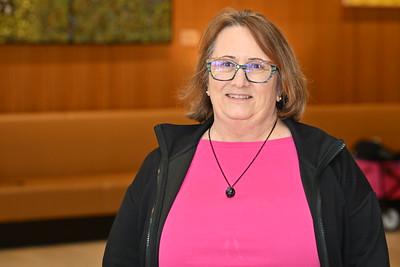
“What guides my work is a love of the work and department. We have an amazing team, both staff and faculty. We all have mutual respect and support for each other and work in kindness – with laughter, lots of laughter. I truly like coming to work, I have great colleagues within the College – all this guides me to be my best for all of them.” – Kasi McMurray
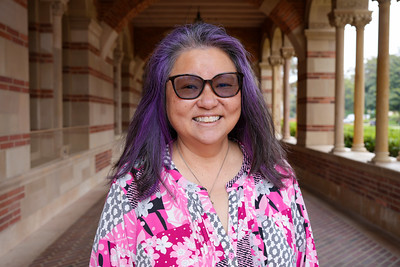
Wendy Fujinami, Department Manager – Department of Asian American Studies
Wendy Fujinami’s inclusive and responsible leadership style as a manager and her equally important expertise as a former student affairs officer have greatly strengthened the academic mission of the Asian American Studies Department (AASD).
Combined, these skills have allowed Fujinami to reorganize the AASD after an extensive departmental review; stabilize the AASD during the COVID-19 pandemic when the Department pivoted to online teaching in 2020-2022; and to promote the vital research, teaching, and service contributions of seven new faculty members. Without Fujinami’s guidance, many of the Department’s faculty and students would not be able to pursue their high-impact research activities in California, nationally and internationally.
“What I especially appreciate most about Wendy is her continued growth as a staff leader, colleague and person over the past few years. She’s responded positively to constructive criticism in her management of all things staff. That is, she’s openly engaged with said feedback, not as a limitation, but rather as an opportunity to further strengthen her knowledge of and engagement with budgetary, curricula and personnel matters.” – Keith Camacho, Chair of UCLA’s Department of Asian American Studies
“After the majority of my 38 years working at UCLA in larger departments, I found my ikigai (joy and purpose) with the Asian American Studies Department. I am so grateful for this moment in time with my amazing staff and hope that I have made a difference in the lives of our students, staff and faculty.” – Wendy Fujinami
Thomas E. Lifka Staff Excellence Award – Excellence in Staff Performance
This award honors exceptional Social Sciences division staff members (non-MSOs/CAOs). This award is open to various staff positions including program and event specialists, office managers, fund managers, communications specialists, staff analysts, student affairs officers, payroll specialists, and IT coordinators, among others.
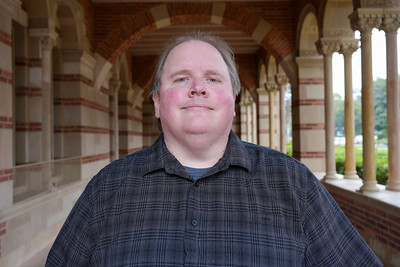
Steven Johnson, Administrative Officer – California Center for Population Research (CCPR)
Steven Johnson’s commitment to innovation, organizational excellence, impactful work, and collaborative spirit make him a truly invaluable member of CCPR’s team. A creative and innovative problem solver, Johnson has helped streamline CCPR processes and the complicated, robust grant portfolio.
With minimal support from other staff, Johnson has also remained the sole fund manager and now personnel manager at CCPR, even as the amount of work has skyrocketed in volume and complexity. Johnson’s dedication to excellence is evident in his unwavering commitment to supporting both faculty and students. He has one of those “can-do” attitudes that always leaves faculty and staff feeling supported.
“Steve is able to manage competing demands. He’s creative, he’s organizationally skilled, and something that I know quite well is that he has unwavering calm in the face of many of us who have sometimes pushed deadlines a little bit closer than we should have…he is a great team player. And I think in order for organizations to succeed, you have to have people exactly like Steve.” – Judith Seltzer, Professor of sociology at UCLA
“What guides my work at CCPR is a deep appreciation for the power of research to expand our understanding. I particularly enjoy helping inexperienced researchers navigate the complexities of academic bureaucracy. It’s incredibly rewarding to support them as they move from uncertainty to confidence, gaining the tools and knowledge they need to succeed in a field that can often feel overwhelming.” – Steven Johnson
Tessa Villaseñor, Director of Student Affairs – UCLA Department of History
A senior member and leader of the Department, Tessa Villaseñor is known for her incredible work ethic and her ability to interact effectively with a large and diverse community of graduate students and faculty. She consistently demonstrates care and concern for students and diplomatic, conscientious leadership.
Villaseñor led the undergraduate counseling team (UG) to adopt Career Services cross-training and History Career Pathway Guides and guided the UG counselor to improve department social media presence and increased student engagement. She also created undergraduate and graduate onboarding guides for training of new student affairs staff. Notably, Villaseñor also led the search and training for both undergraduate and graduate advisor positions when they were vacant in Winter 2023, and created the onboarding guides in the process. The guides have allowed the department to ensure a reference point is established for future hires in the student affairs area.
“I have turned to Tessa for advice, I don’t know how many times, and I really, truly value her judgment. Tessa really cares about the students, and they know it… I have seen her go above and beyond the call of duty and her pay grade so many times. In fact, one student who filed their dissertation recently thanked Tessa, first and foremost in the acknowledgements, even before thanking their advisor — I know because I was on that dissertation committee.” – Kevin Terraciano, Chair of UCLA’s Meyer and Renee Luskin Department of History
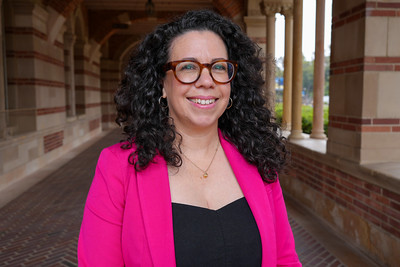
“As a Los Angeles native, I have had the privilege of attending California public schools from pre-K to University (UC Berkeley, class of 2000). I have borne witness – personally and professionally – to how a high-quality public education transforms people’s lives, myself included. This inspires my work at UCLA, where I hope to continually pay it forward for our current students and those to come.” – Tessa Villaseñor
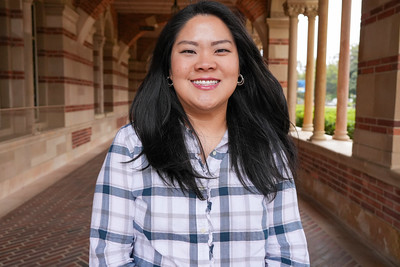
Esther Blair, Director of Student Services – Department of Political Science
Esther Blair has been the driving force behind the successful creation and ongoing success of the department’s two Summer Session High School Institutes—initiatives that have not only enhanced the department’s visibility and outreach but have also generated additional revenue for her Department. Blair’s leadership and dedication were critical at every stage of these initiatives, she partnered with faculty to craft engaging and academically rigorous syllabi and thoughtfully curated enriching extracurricular activities.
An essential and often unseen dimension of Blair’s excellence is the profound care and moral integrity she brings to her work—particularly in her interactions with graduate students. Blair understands that beyond policies and procedures, there exists an “unwritten syllabus” of graduate life — a set of emotional, ethical, and personal challenges that students navigate, often silently. In the moments when students are most vulnerable, Blair’s commitment to making that hidden syllabus visible, and to supporting students with honesty and compassion, reflects the highest standard of moral excellence. Her leadership is not only defined by the efficiency and effectiveness of her professional duties but also by her deep and unwavering care for the people affected by her work.
“Esther’s contributions to our department are numerous, and they’re also transformational. She has redefined what staff excellence for us looks like by combining important insights with her human touch, her work doesn’t just get things done, but it genuinely creates an impact.” – Davide Panagia, Chair of UCLA’s Department of Political Science
“For almost the last 8 years, I have loved working in the Department of Political Science. What motivates me each day are the personal relationships and connections with faculty, students and staff. It is such an honor to be part of their journey into academic appointments, industry positions, and personal milestones like starting a family. My hope and mission for my role is to always offer a safe space, empower students to engage deeply with the world around them, and deliver high quality service to support their goals in the doctoral program. I feel very blessed to work in such a supportive department and environment. I am so grateful and honored for this nomination and award.”– Esther Blair
Zachary Burwell, Graduate Advisor – UCLA Department of Communication
Zachary Burwell is extremely organized at juggling his many job responsibilities as a graduate advisor. Among some of his key accomplishments, Burwell created a teaching assistant matching system that has facilitated the most mutually beneficial class matches for both PhD students and faculty.
Throughout his tenure, Burwell has agreed to fulfill the duties previously unfamiliar to him and has often lent a hand to other departments in the Social Sciences Division, such as history, anthropology, and political science, when their student affairs officers were on leave, or such positions were vacant due to resignations. He has also supported the search for new staff members.
“My first year as chair was the first year of our PhD program during COVID, and Zack stepped in and basically established the way we run the graduate program. The graduate students really respond to him, and he’s extremely supportive in all their endeavors.” – Gregory Bryant, Chair of UCLA’s Department of Communication
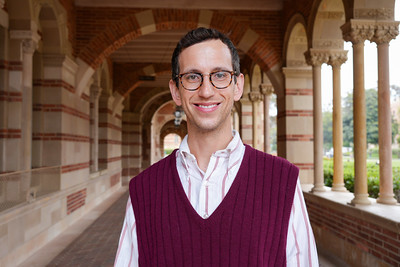
“What guides my work at the Department of Communication are the amazing students, faculty and staff members whom I have the privilege to support. It is truly an honor to assist and collaborate with the people who make meaningful research contributions to the larger academic community. On a personal level, it’s a lot of fun to get to know students and faculty who come from a wide range of backgrounds and have a unique perspective on a great many things.”–Zachary Burwell
View photos from the 2025 Thomas E. Lifka Staff Appreciation Luncheon and Awards Ceremony, here.
Learn more about the Thomas E. Lifka Award, here.
Learn more about Thomas E. Lifka’s philanthropic contributions to UCLA’s Division of Social Sciences, here.
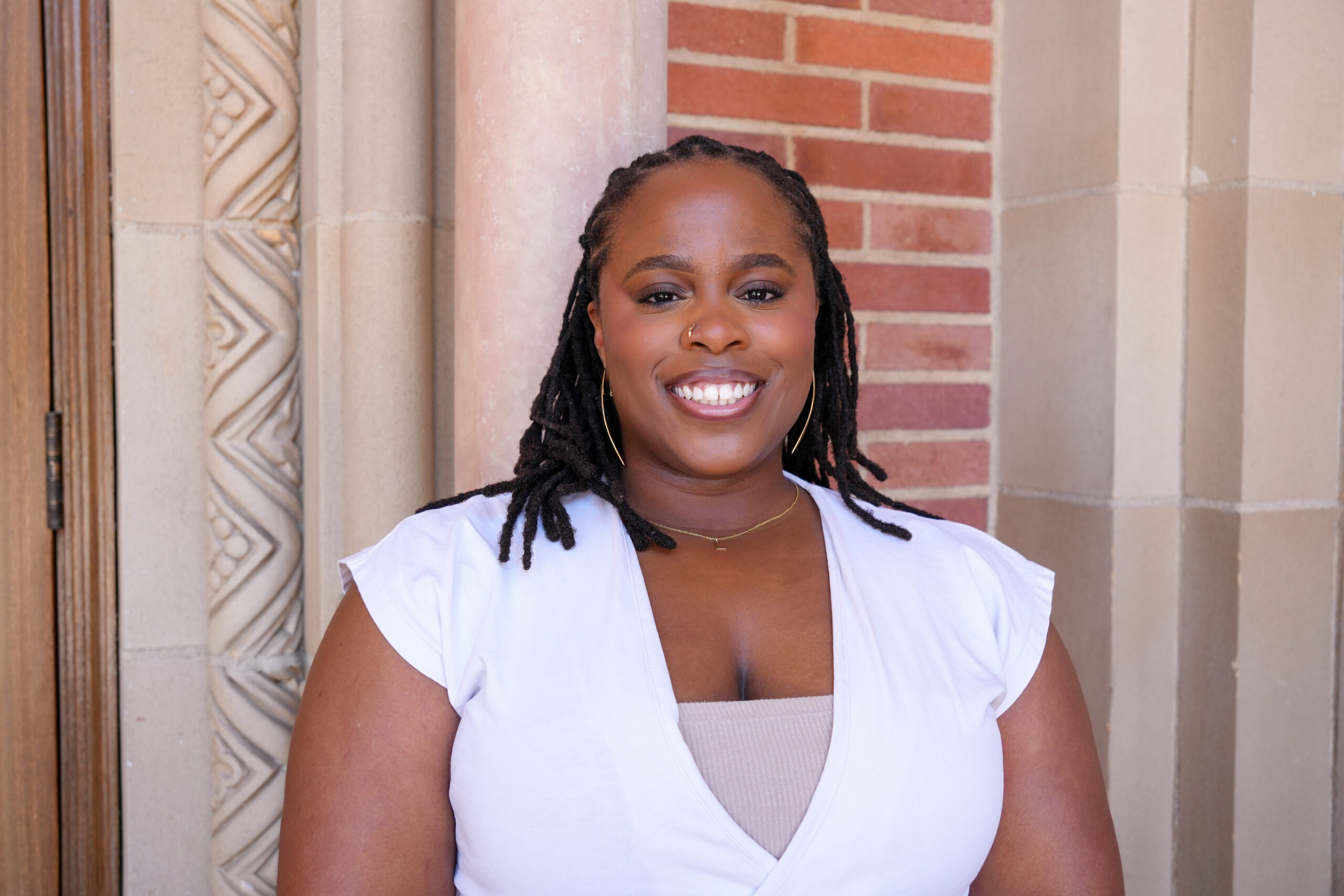
The gender studies doctoral candidate was recognized for her ‘generous and inclusive approach to teaching’ and will receive a $30,000 dissertation fellowship award
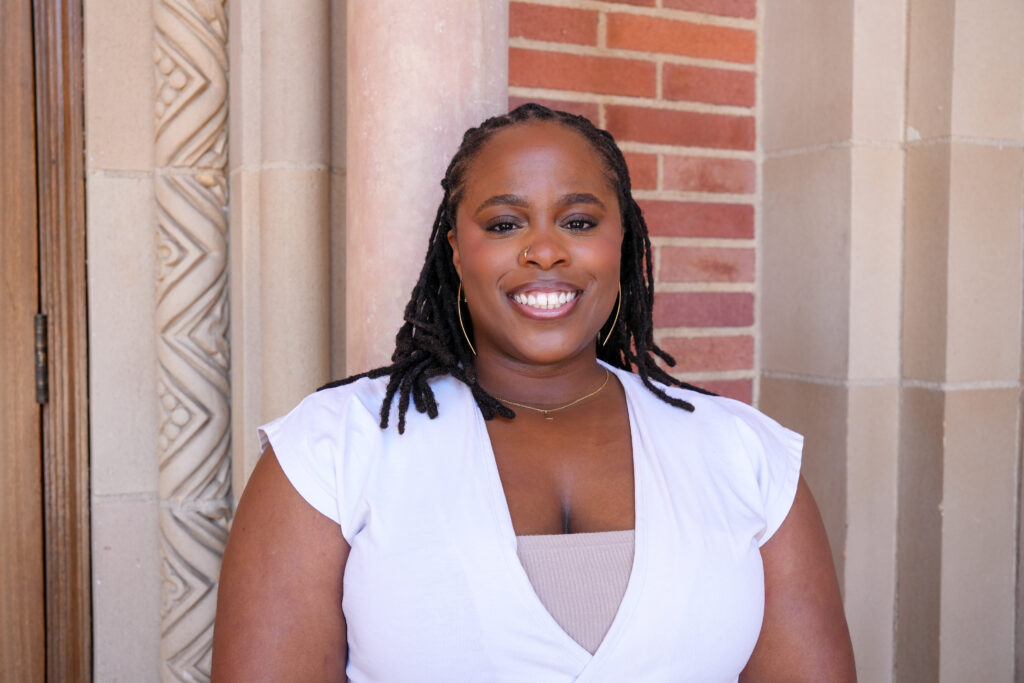
Citlalli Chávez-Nava
Lynette Dixon, doctoral candidate in UCLA’s Department of Gender Studies, has been awarded the Distinguished Teaching Assistant Award by UCLA’s Teaching and Learning Center, becoming her department’s first recipient. The award recognizes teaching assistants who advance pedagogical practices that inspire, challenge and support all students.
Dixon, who serves as her department’s Teaching Assistant Consultant —a position held by experienced graduate students who teach a department’s pedagogy courses known for their 495-level classification — imparts teaching and classroom facilitation skills to fellow graduate students.
Elizabeth Marchant, chair of UCLA’s Gender Studies Department, praised Dixon’s reputation as an excellent teacher and mentor whose exemplary teaching impact extends across multiple disciplines on campus.
“When I looked at her Gender Studies 495 class roster, a required course for doctoral students in our department, I wasn’t surprised to find students from seven other graduate programs on campus had filled the class beyond its fifteen-seat cap, the enrollment is now at sixteen — only four of whom comprise our own second-year cohort,” said Marchant.
Dixon’s teaching philosophy leaves no student behind and is deeply influenced by the work of Black feminist theorist bell hooks, and particularly by her books “Teaching Critical Thinking” and “Teaching to Transgress: Education as the Practice of Freedom.”
“I think that students are often taught that they have to mask, discipline or leave parts of themselves outside of the classroom to be successful, but I try to resist that in how I show up,” said Dixon. “This is reflected in my flexible course policies and the way my lesson plans may change depending on our collective needs at the moment.”
Across varied courses and modes of teaching, Dixon’s evaluations are uniformly outstanding. In addition to the graduate pedagogy seminar, Dixon also teaches upper-division elective courses including: “Gender Studies 185: Cinematic Representations of Black Gender;” the core undergraduate course, “Gender Studies 102: Power;” and a large general education lecture course, “Gender Studies 10: Introduction to Gender Studies.”
“She has brought a generous and inclusive approach to teaching a broad range of courses, and we are truly inspired and delighted to benefit from her relentless dedication,” added Marchant.
Dixon’s classroom philosophy
“The feminist phrase the ‘personal is political,’ the idea that personal experiences are shaped by systems of power, is my North Star in the classroom. Many of the courses I teach focus on the study of power, and I make sure to demonstrate the connection between the personal and the political through my pedagogy. Therefore, I invite students to bring their whole selves into the classroom as part of the work we do: their identities, their interests, concerns and questions, culture, knowledge and epistemologies and previous experiences. The course texts and materials allow us to anchor all that the students bring, so we find common ground in and learn through it all.” – Lynette Dixon
Beyond the classroom, Dixon also works one-on-one with students as a writing instructor for the Gender Studies Writing Lab which offers writing support for department majors, and as a graduate research mentor for the Mellon Mays Research Symposium and the Undergraduate Research Center.
Dixon joins only five other awardees selected from an extensive group of extraordinary nominees selected by UCLA’s Teaching and Learning Center, a center on campus which aims to empower educators to advance instructional excellence through innovative resources and collaboration.
In recognition of her outstanding contributions to teaching, Dixon will receive a certificate and a $2,500 award, and a $30,000 Dissertation Year Fellowship Award from UCLA’s Division of Graduate Education. She will also be recognized at the annual Andrea L. Rich Night to Honor Teaching event in the fall.
“I am extremely grateful to receive this award since it will allow me to finish the final chapters of my dissertation and submit a chapter for publication,” said Dixon. “Soon, I will be applying for academic positions as I finish my dissertation, and this award will afford me the time to do so.”
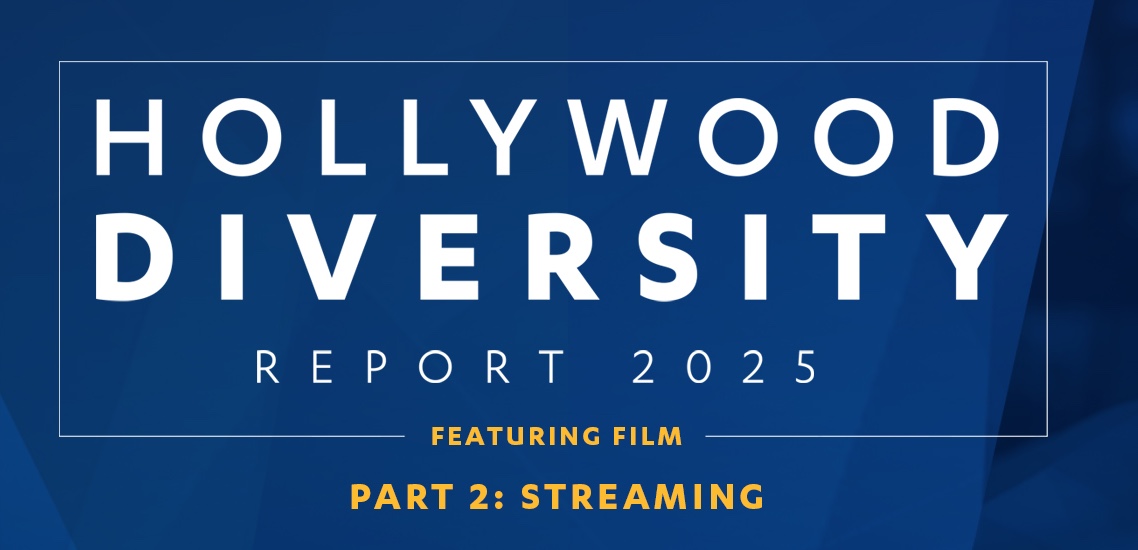
NEW! UCLA Hollywood Diversity Report 2025, Part 2: Streaming is now available.
Download the full report HERE
For any media inquiries, please contact Eddie North-Hager at enhager@stratcomm.ucla.edu or Barbra Ramos at bramos@stratcomm.ucla.edu.
For donor/sponsor inquiries, please contact Peter Evans at pevans@support.ucla.eduor Lisa Mohan at lmohan@support.ucla.edu
To download any of the previous reports in the Hollywood Diversity Report series, click HERE.
To learn more about the UCLA Entertainment and Media Research Initiative, click HERE.
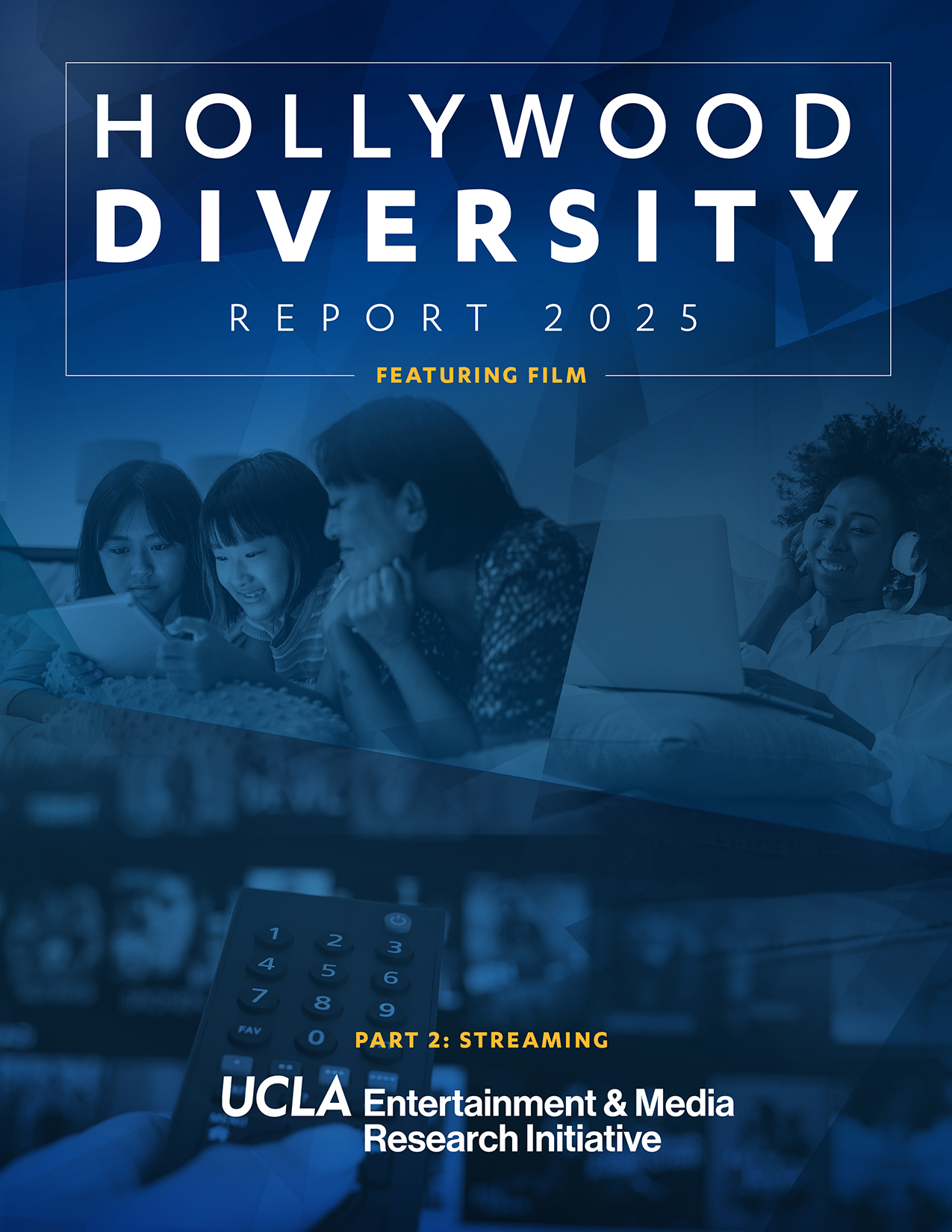
UCLA Hollywood Diversity Report 2025, Part 1: Theatrical Download the full report HERE
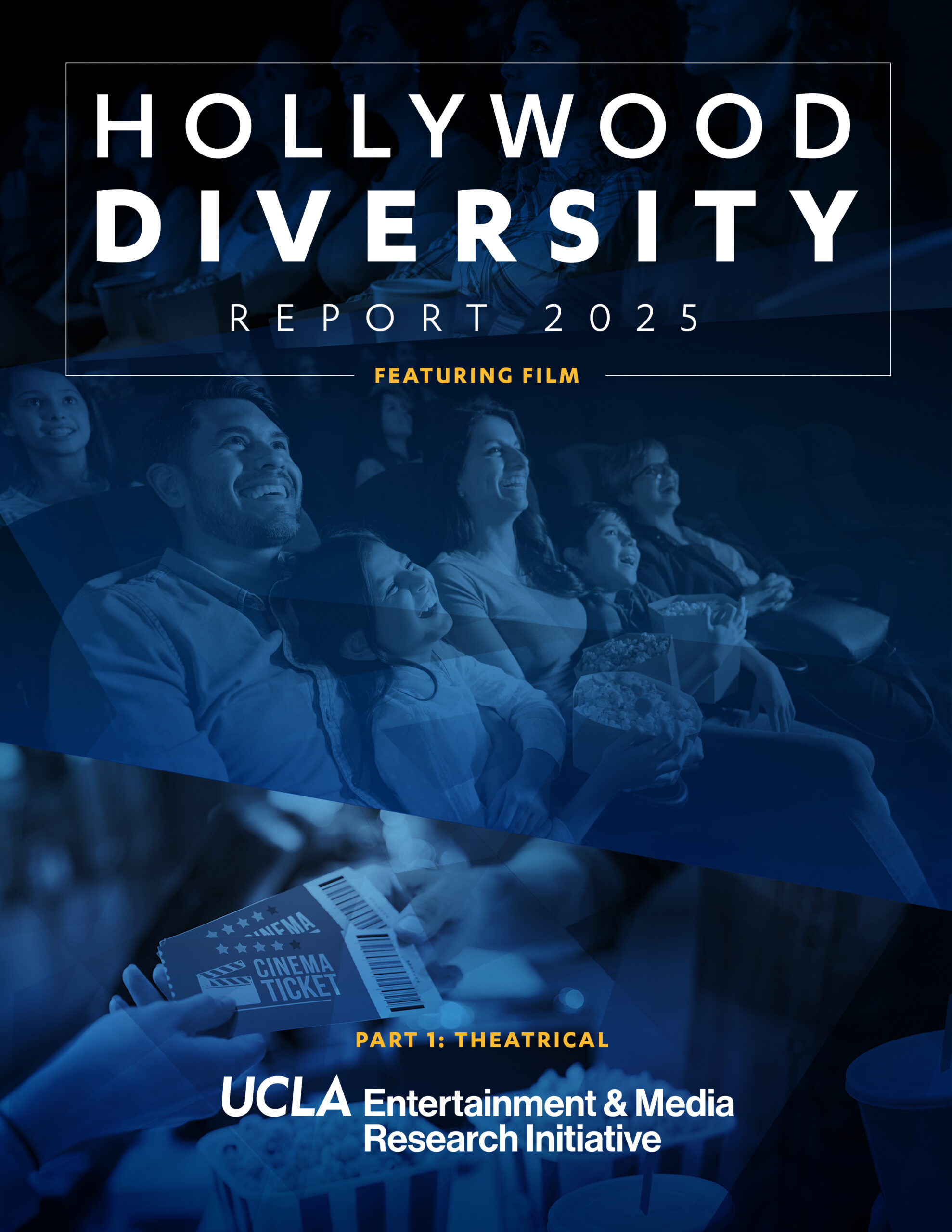


Citlalli Chávez-Nava
The twelfth annual Undergraduate Research Week, a week-long celebration of multidisciplinary undergraduate research and creative inquiry at UCLA where students gather to share their innovative and impactful ideas creating the campus’ largest undergraduate research conference, was held May 19-23.
The event is produced by the Undergraduate Research Center – Social Sciences, Humanities, Arts, and the Undergraduate Research Center – in collaboration with the UCLA Division of Undergraduate Education, UCLA Library, UCLA Alumni Affairs, the Undergraduate Science Journal, and Aleph: Undergraduate Research Journal for the Humanities and Social Sciences.
Below is a listing of this year’s social science award winners.
The Dean’s Prize for Excellence in Research and Creativity Award for humanities, arts, and social science students is awarded for outstanding recorded presentations and multimedia at the Undergraduate Research & Creativity Showcase.
| Year | Student | Major | Project Title | Faculty Mentor |
| 2025 | Narod Arisian | History | Anjar’s Urban Fabric and the Stranger Within: Tracing the Evolution of Armenian Diasporic Consciousness and Transnationalism | Dr. David N. Myers |
| 2025 | Kristina Dove | Anthropology | “On the Razors Edge:” Women’s Sex Work, Roles of Advocacy, and the Law | Dr. Jessica Cattelino |
| 2025 | Ellen Lu | History | Laundry Swindlers and Lost Sisters: The Gendered Dimensions of Anti-Chinese Activism, 1868-1905 | Dr. Katherine Marino |
| 2025 | Yanci Rosales Huezo | Anthropology | “We Do Not Depend on You”: Nawat-Pipil Efforts in Preserving Identity and Ancestral Knowledge in western El Salvador | Dr. Shannon Speed |
| 2025 | Emily Rusting | Political Science, History | Identity Politics: The Effect of Affective Polarization on Americans’ Attitudes Toward Outparty-Stereotypical Groups | Dr. Efren Perez |
| 2025 | Tiara Weedagama | Sociology | Bridging the Gaps: Regional Disparities in Global Nutritional Aid Networks | Dr. Chris Wegemer |
| 2025 | Jeannine Xu | Sociology & Communications | Perceived Unfairness in AI Interactions: Examining Trust, Attribution, and Emotional Responses | Dr. Steven Peterson |
| 2025 | Wanchen Yu | Psychology, Communication | Trust in AI: The Influence of Embedded Ideologies in AI-Generated Content on People’s Perceptions | Dr. Steven Peterson |
The Faculty Mentor Award honors the considerable dedication of UCLA faculty who consistently and enthusiastically serve as effective mentors to undergraduate students involved in research or creative inquiry. Faculty are nominated by undergraduate students they supported in their research or creative practice and professional development.
| Faculty | Department | Year |
| Jessica Cattelino | Anthropology | 2025 |
| Ugo Edu | African American Studies | 2025 |
| Tamar Kremer-Sadlik | Anthropology | 2025 |
| Jared McBride | History | 2025 |
| Salma Mousa | Political Science | 2025 |
To learn more about undergraduate research week, visit: UCLA Undergraduate Research Week.
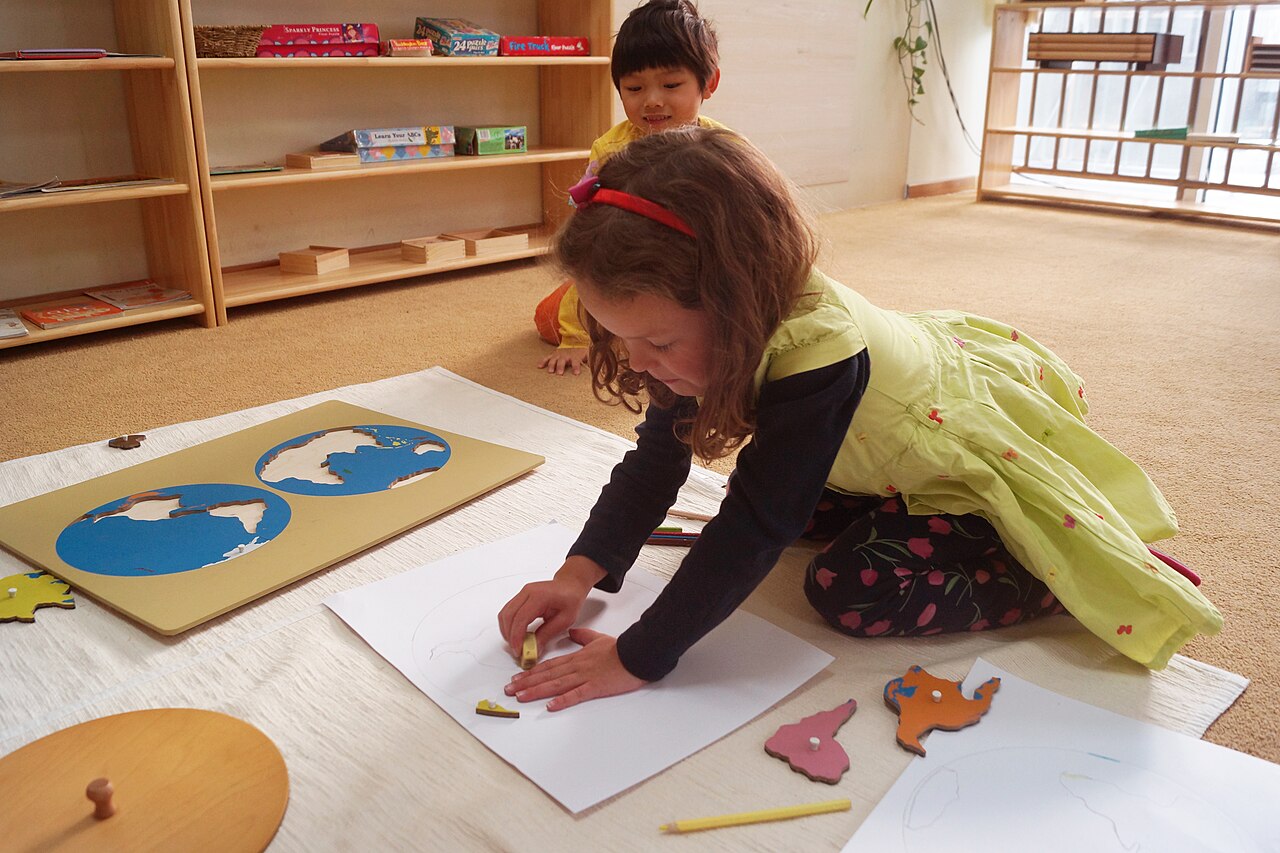
Participants in social safety net programs had higher rates of employment, were less reliant on public assistance
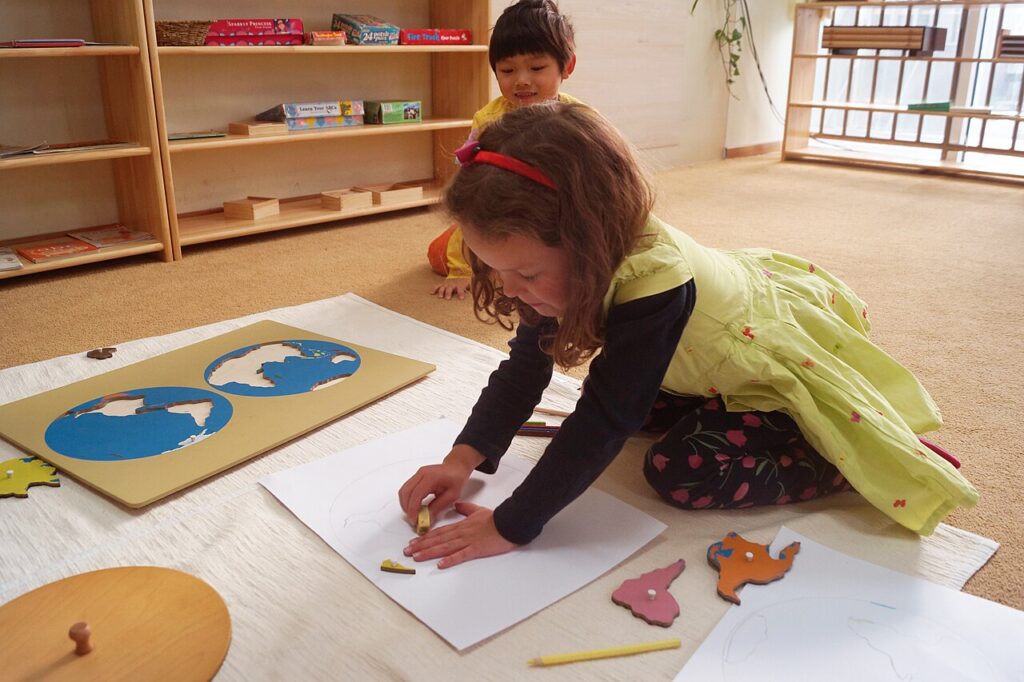
Citlalli Chávez-Nava
As federal social safety net programs face elimination or budgetary reductions under the new administration, a UCLA report has found some of the boldest War on Poverty programs launched in the 1960s and 1970s reduced poverty and improved upward mobility and well-being.
Launched in 1964 by President Lyndon Johnson’s administration, the War on Poverty represented one of the largest and most comprehensive attempts to improve well-being in United States history. The administration invested billions of dollars in education, health, employment and community development initiatives — including Head Start, an expanded food stamp program, family planning programs and community health centers. The campaign targeted the roots of poverty, seeking to provide a “hand up, not a handout.”
The study, recently published by the National Bureau of Economic Research, looks at how access to these programs for children in the 1960s and 1970s shaped the outcomes and living circumstances of tens of millions of adults today, using newly available large-scale data from the U.S. Census Bureau and the Social Security Administration. The decades-long research was led by Martha Bailey, professor of economics and director of the California Center for Population Research at UCLA.
Head Start, which aimed to reduce poverty and still serves 1 million children today, offers early education to preschool and kindergarten-aged children, nutritious meals and referrals to health and other social services. But for decades, evaluating the program’s success in helping children escape poverty was difficult since researchers faced data challenges in identifying valid comparison groups.
Using the newly available data, researchers measured Head Start’s success in terms of children’s later-life educational attainment, work in professional occupations, participation in the labor force and wage earnings. Researchers compared children who were born a few months too soon to enroll during Head Start’s initial rollout with children who did enroll. Head Start children were significantly more likely to finish high school and enroll in and finish college than peers who entered first grade without access to the program (Figure 1). The results also show that cohorts with access to Head Start experienced lower rates of adult poverty, had higher rates of employment and were less likely to have received public assistance.
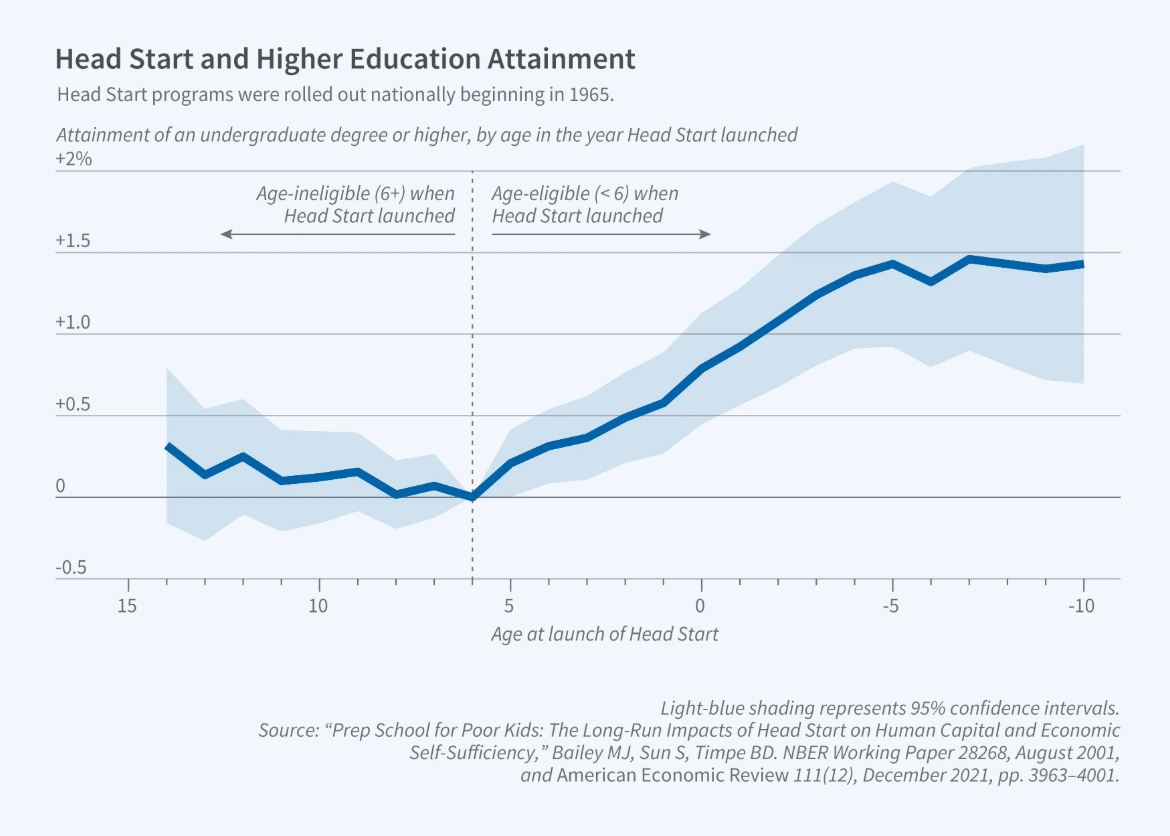
“It’s important to consider the long-run consequences of public programs,” Bailey said. “Investing in children is like planting a seed. Many of the programs starting in the 1960s are still having measurable effects today.”
Based on analyses of hundreds of on-the-ground programs across the U.S., the report also found:
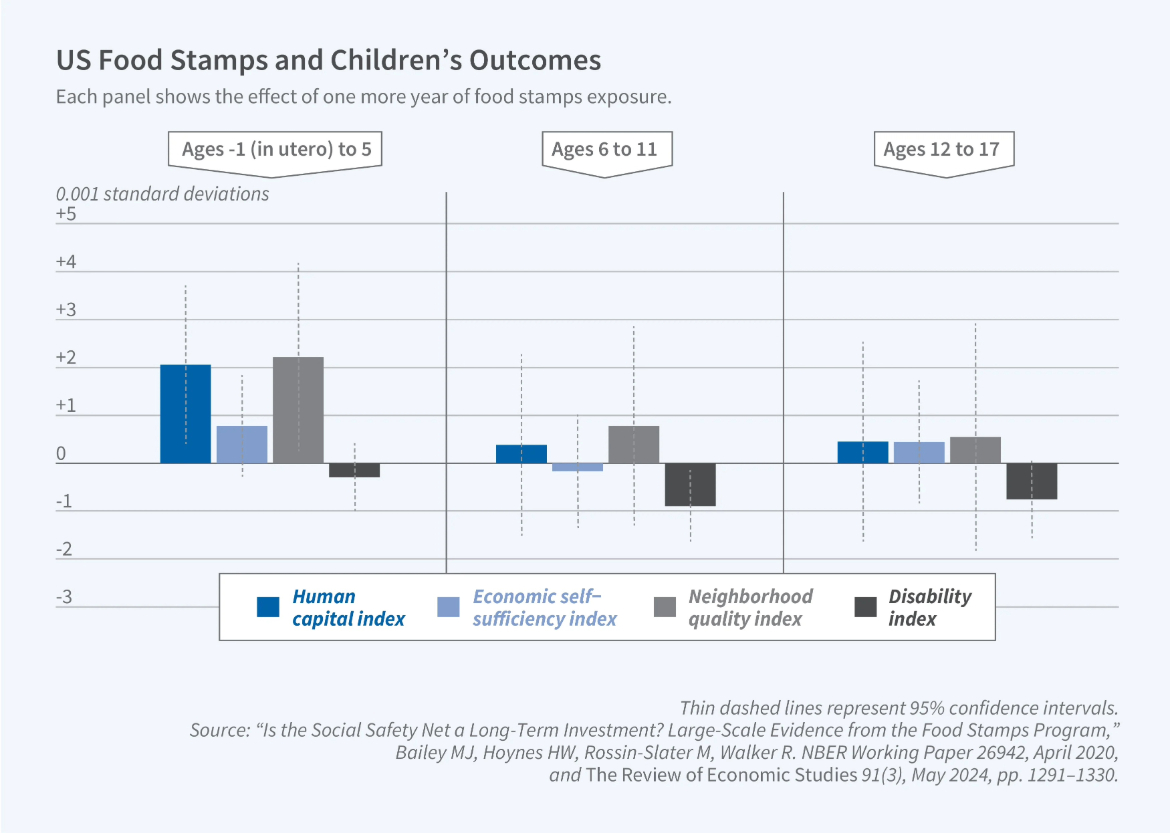
“The data show that U.S. poverty rates, health, human capital and employment outcomes would have been worse today without the substantial investments made under the War on Poverty,” Bailey said. “In many cases, the benefits of the programs well exceeded their costs.”
This story was originally published in UCLA’s Newsroom, here.
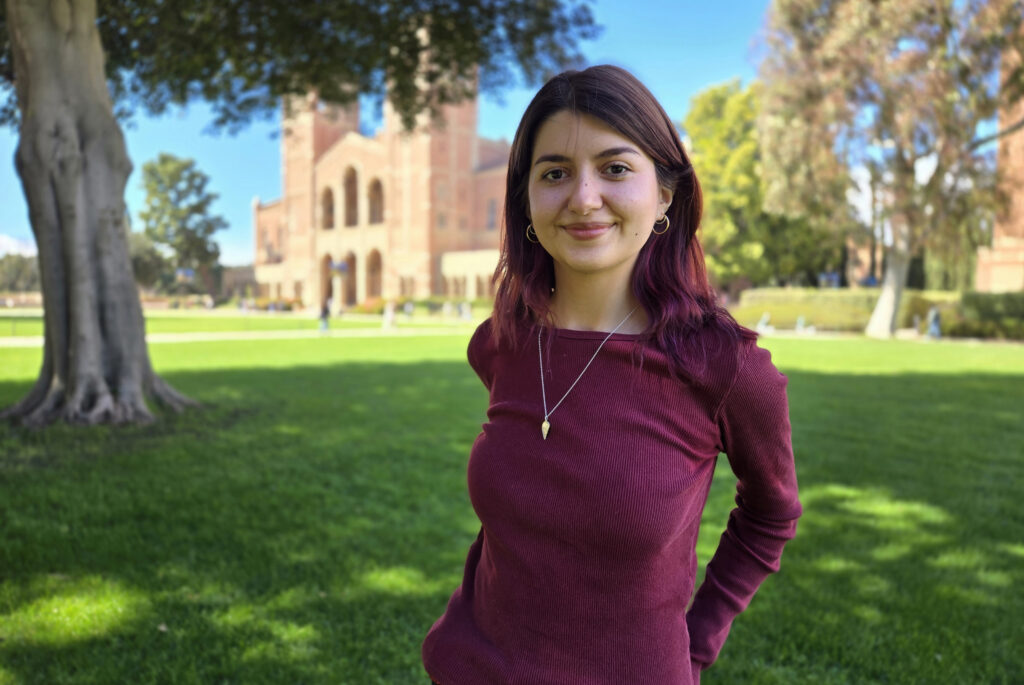
Victoria Gutierrez’s senior research examines how Salton Sea residents organize to overcome poverty, environmental challenges
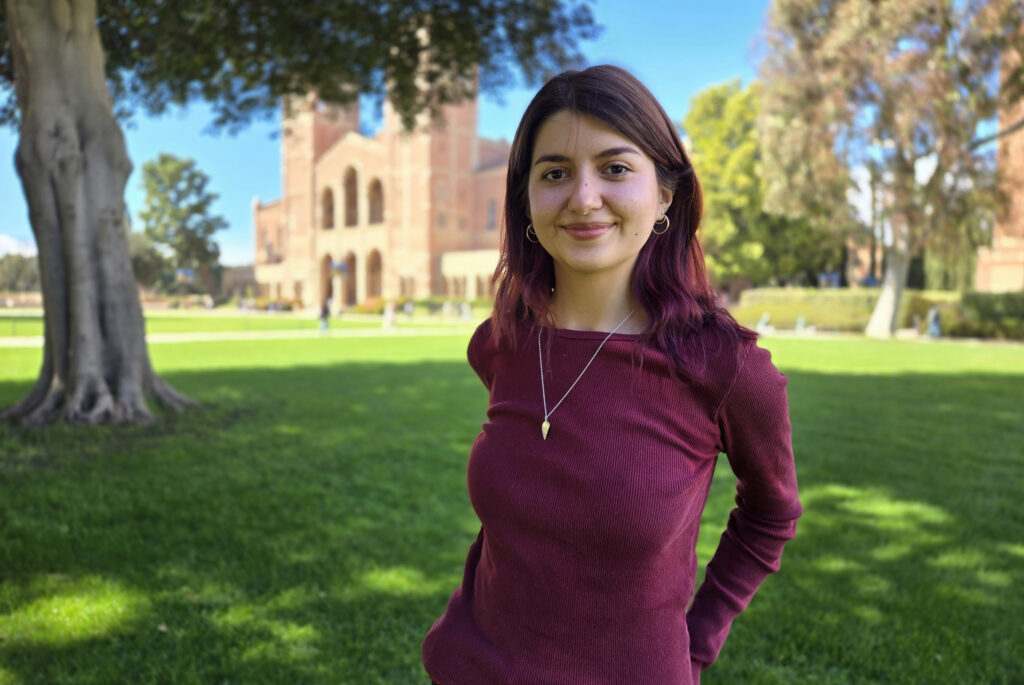
Sean Brenner | May 7, 2025
The research project Victoria Gutierrez is completing as a UCLA senior was inspired by a set of photographs she saw years before she set foot on campus.
As a 14-year-old, Gutierrez came across pictures of Salvation Mountain, the massive, colorfully painted folk art installation in the midst of a barren desert landscape in the Salton Sea region of southern California.
“I remember thinking, ‘What is this place? I have to go there,’” she said. The thought stayed with her over the next few years, and she pondered the small communities of people living there.
“It’s very beautiful, but it’s very desolate, plants don’t really grow and it’s known for having toxic dust that comes from the Salton Sea,” Gutierrez said. “I just wondered, how do people live there, how do they cook, how do they do this? Those questions just lived in my brain for a long time.”
Shortly after Gutierrez arrived at UCLA — the Rhode Island native transferred in 2023 from Saddleback College — the opportunity to explore those questions arose. Determined to pursue her own research project, she set up a meeting at the Undergraduate Research Center. It was there that a UCLA graduate student named Jewell Humphrey suggested that Gutierrez think about what questions she had always wanted to find answers to.
The Salton Sea came immediately to mind.
After she discussed possible research approaches with UCLA anthropology professors Jason De León and Jason Throop, Gutierrez had a concept for a sophisticated anthropological study. The project, which is supported by the UCLA/Keck Humanistic Inquiry Undergraduate Research Program, focuses on how residents of Bombay Beach and Slab City cope with the ecological damage, extreme poverty and limited government support they face — and how they organize in an attempt to overcome those challenges.
“Victoria’s project seeks to understand the experiences of those living on the margins in rural California and how people attempt to build community in places where infrastructure, poverty and climate change work to disrupt social networks,” said De León, who also has a faculty appointment in Chicana and Chicano studies and is a member of the Cotsen Institute of Archeology.
“As we move into a new era of climate change whereby the haves and have-nots differentially experience things like droughts, rising temperatures and other catastrophic environmental events, projects such as Victoria’s will become increasingly important. I applaud her for tackling such an important social issue.”

Over the past year, Gutierrez has conducted dozens of interviews with residents and spent weeks living among them, even volunteering at a cooling center — a climate-controlled trailer where locals can escape the oppressive heat.
“I’d do 12-hour shifts, just making sure the air conditioning was on,” she said. “People would come in, and I would get to talk to them for really long periods of time.”
Initially, Gutierrez planned to focus on the role of climate change in the region, but she changed gears when she realized residents were more focused on their efforts to improve their communities. One woman she interviewed was applying for grants to build a park in Bombay Beach.
“I was really inspired by how these people kept wanting to do better for themselves, even in the face of seemingly insurmountable obstacles,” said Gutierrez, a political science major and anthropology minor.
Her study also highlights the stark realities of poverty. Many residents told her they had ended up in the area mostly because they had nowhere else to go. She recounted the story of one woman, Belinda, who had been arrested as a teenager and never had access to formal education.
“She is functionally illiterate, has no degree and suffers from severe health conditions,” Gutierrez said. “If she lived in L.A., she’d probably be in far worse conditions. But in Bombay Beach, she’s welcomed and seen as a respectable member of society.”

Gutierrez’s study is timely: In January, a judge cleared the way for a long-planned project that will mine large amounts of lithium from the ground beneath the Salton Sea. Lithium is an essential component of electric car batteries, mobile phones and numerous other products, and the region is said to have an enormous supply, so the potential economic benefits are obvious. But the possible ecological consequences, in particular, have worried locals and environmental activists.
“It’s really curious that the first meaningful efforts to clean up the Salton Sea are happening just two years after it was declared the largest domestic deposit of lithium,” Gutierrez said.
And although the communities of the Salton Sea face an unusual set of challenges, Gutierrez said her research has made clear that the region holds lessons for everyone, no matter where they live.
“One of my biggest takeaways is that we’re all a lot closer to being in a situation like Bombay Beach than we think,” she said. “With climate change, wildfires and economic instability, these issues aren’t as far removed as they seem.”
Gutierrez is still deciding what her next steps after graduation will be, but one way or another, she’s determined to continue studying the region. “I love the Salton Sea,” she said. “I feel very lucky that I know what I care about.”
This story was originally published via UCLA Humanities.
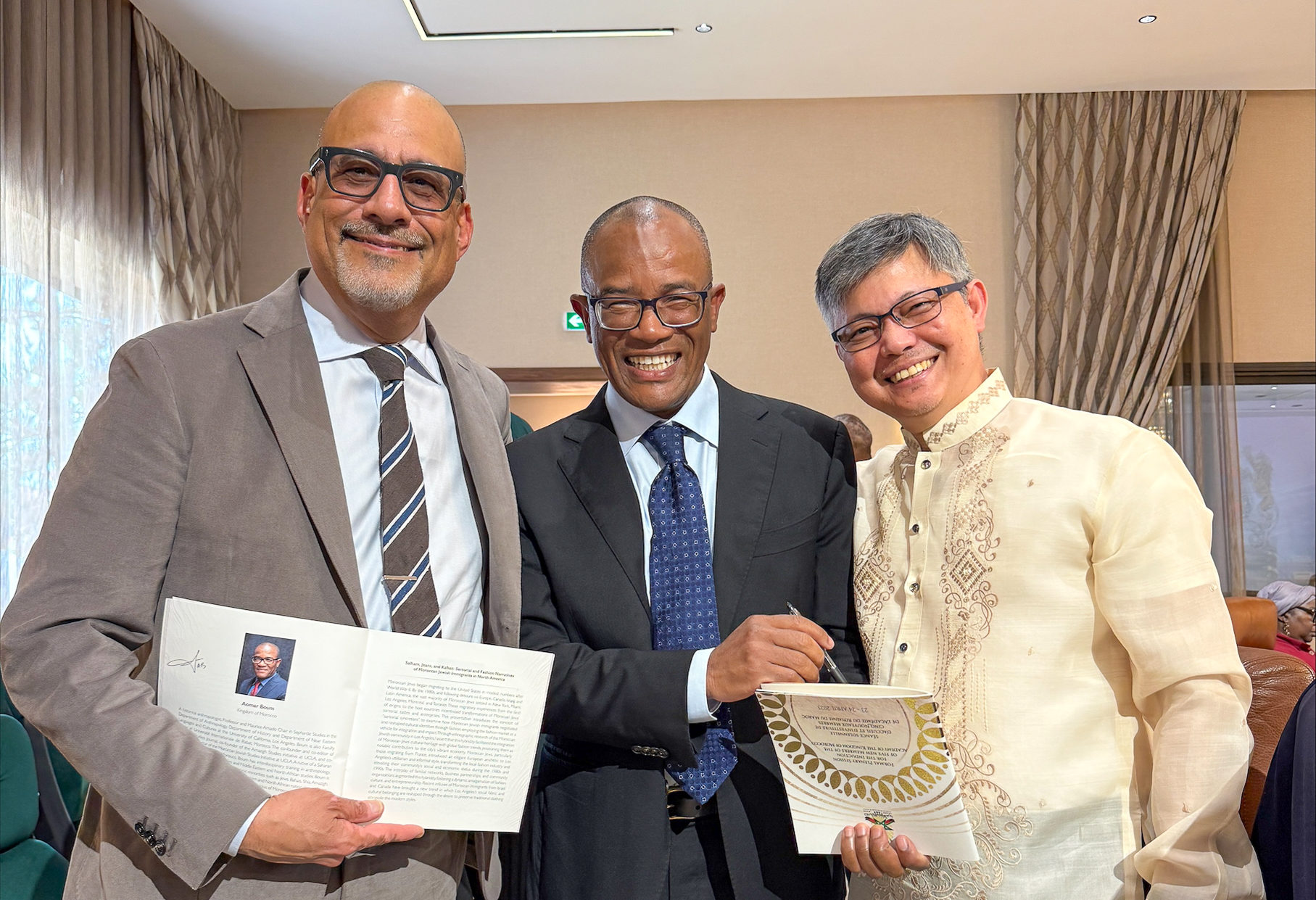
UCLA Anthropology
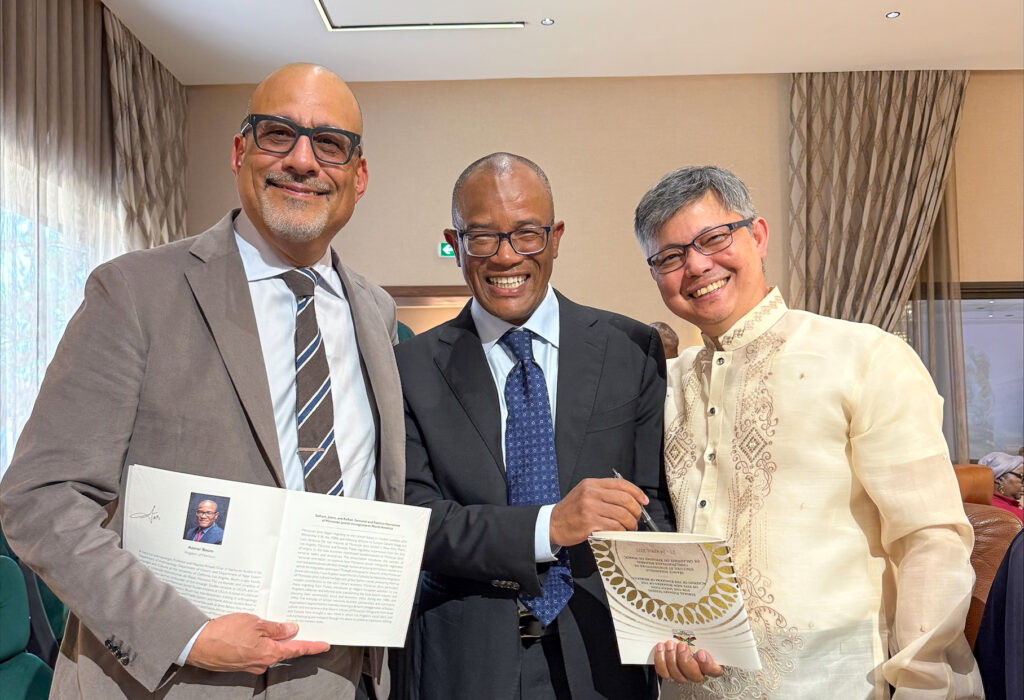
Abel Valenzuela, Aomar Boum and Stephen Acabado (left to right) at National Academy ceremony of the Kingdom of Morocco./UCLA Anthropology
Aomar Boum, professor of anthropology and of Near Eastern languages and cultures at UCLA, was inducted into the National Academy of the Kingdom of Morocco at a ceremony held April 24 in Rabat, Morocco.
It was a moment that brought together so many parts of his life, connecting his early years in Morocco to his years of scholarship and community building abroad. True to form, Boum began his remarks by thanking the mentors, colleagues, friends and family members who had guided and supported him throughout his scholarly and personal growth.
“That introduction was overwhelming in the best way. I truly can’t thank my mentors and family enough for their support,” Boum said.
It was also a proud and emotional moment for Boum’s colleagues who have witnessed his dedication and impact over the years.
“Aomar’s work has always shown us how community histories are deeply tied to landscapes. It’s only fitting that our new UCLA-UIR (Université Internationale de Rabat) Highland Ecology Project in Morocco builds on his legacy — centering local knowledge, memory, and the environment,” said Stephen Acabado, fellow professor of anthropology and chair of the UCLA’s Archaeology Interdepartmental Program, who attended the ceremony.
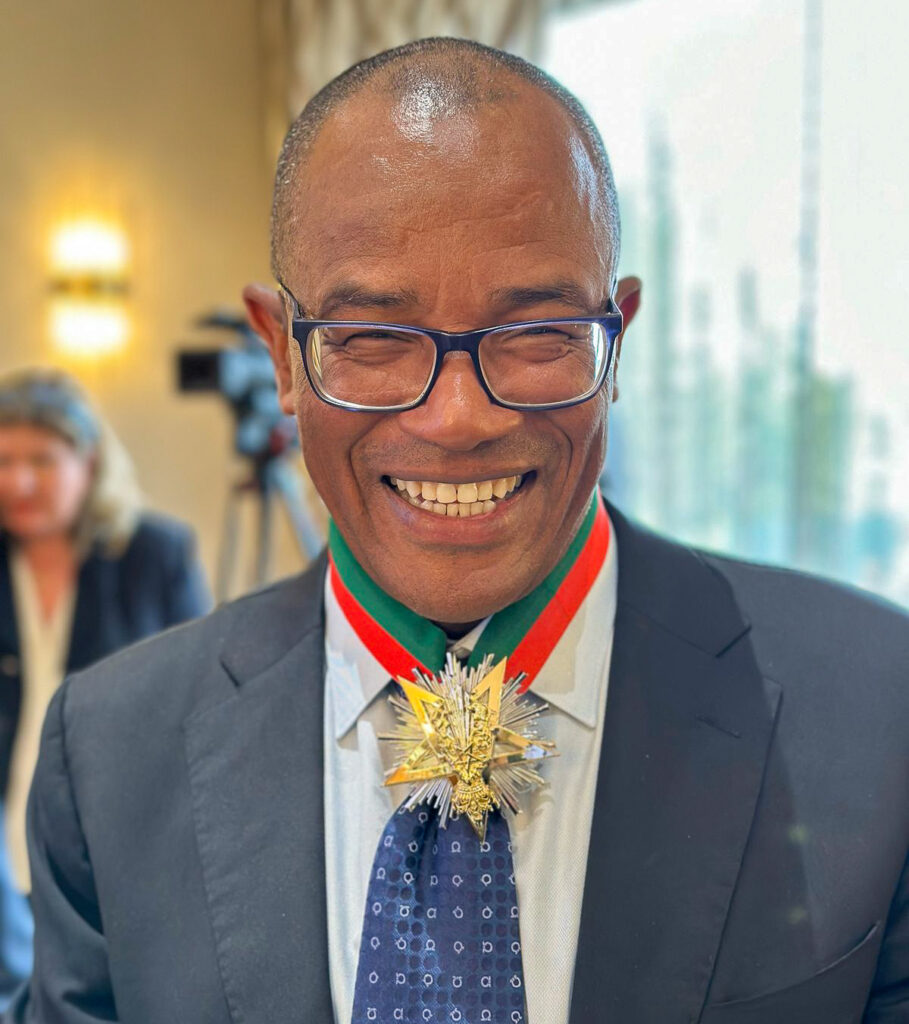
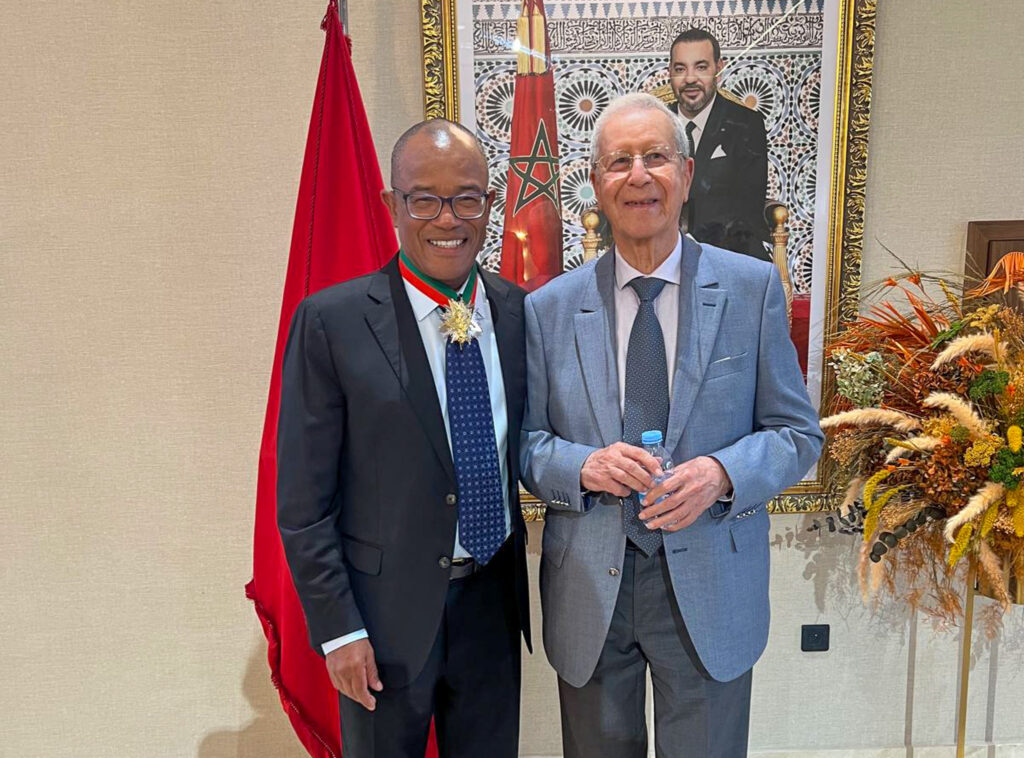
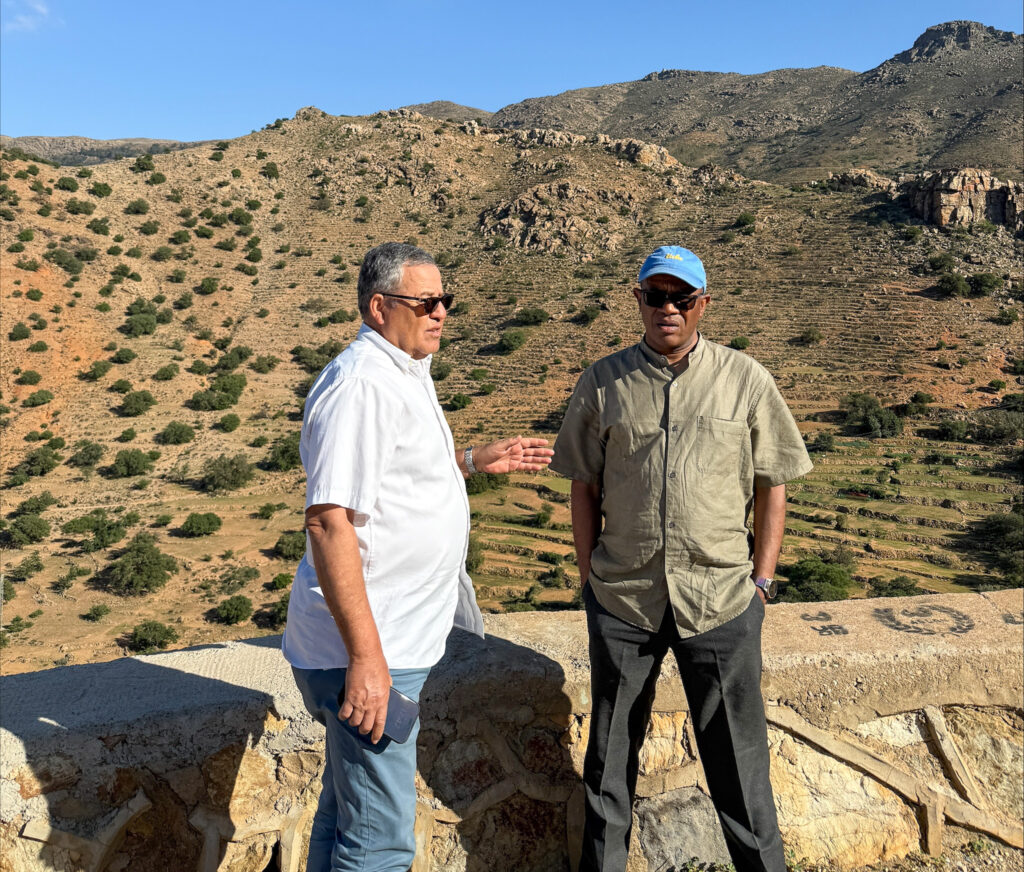
Born in Foum Zguid, in Tata province, Boum’s early experiences in a Saharan Amazigh community shaped the way he approaches history, identity and belonging. Today, he holds appointments in the departments of anthropology, history and Near Eastern Languages and Cultures at UCLA. His research has centered on the complexities of religious and ethnic minorities in North Africa, and his work has challenged and broadened the narratives about Jewish-Muslim relations across the Middle East and North Africa.
At the induction ceremony, Boum delivered a lecture that captured the spirit of his scholarship: Salham, Jeans, and Kaftan: Sartorial and Fashion Narratives of Moroccan Jewish Immigrants in North America. In this talk, he explored how the Moroccan Jewish community in Los Angeles integrated into the larger LA community through global fashion trends, positioning themselves not on the margins but as notable contributors to the city’s economy. Boum introduced the concept of “sartorial syncretism” to describe how Moroccan Jewish immigrants negotiated and reshaped cultural identities through fashion, using the marketplace and style as vehicles for integration, entrepreneurship and cultural impact.
“His lecture was an eye-opening and textured portrait of migration, identity and economic creativity — areas where Aomar’s work continues to open new conversations,” said Acabado.
The ceremony was made even more meaningful by the presence of UCLA Division of Social Sciences Dean Abel Valenzuela, who traveled to Morocco to honor Boum’s achievements. Dean Valenzuela’s attendance reflected the respect Boum commands not only at UCLA but also globally.
“It was a complete honor to be in attendance to celebrate Professor Boum,” said Dean Valenzuela. “His research represents what UCLA does best — engaged, interdisciplinary scholarship that crosses borders and connects communities.”
Boum’s election to the National Academy affirms the significance of his work and the reach of his scholarship. It is also a proud moment for anthropology, especially among his colleagues in the Department of Anthropology at UCLA, who have long recognized the depth and impact of his contributions.
“Boum’s work reminds us how histories of migration, belonging and creativity can reshape how we understand our shared worlds,” added Acabado.
Related Story: UCLA College | Aomar Boum believes in the power of stories to unite
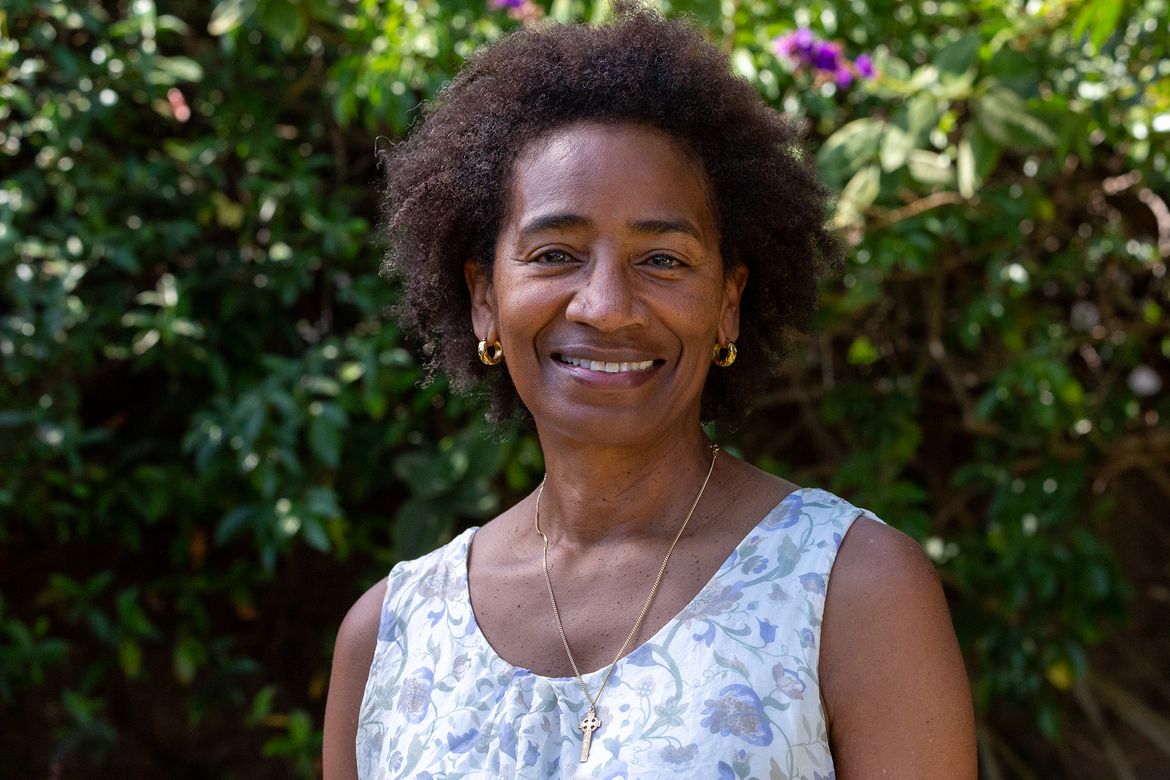
Raphael is a professor of geography and the Institute of the Environment and Sustainability at UCLA
Adapted from UCLA Newsroom
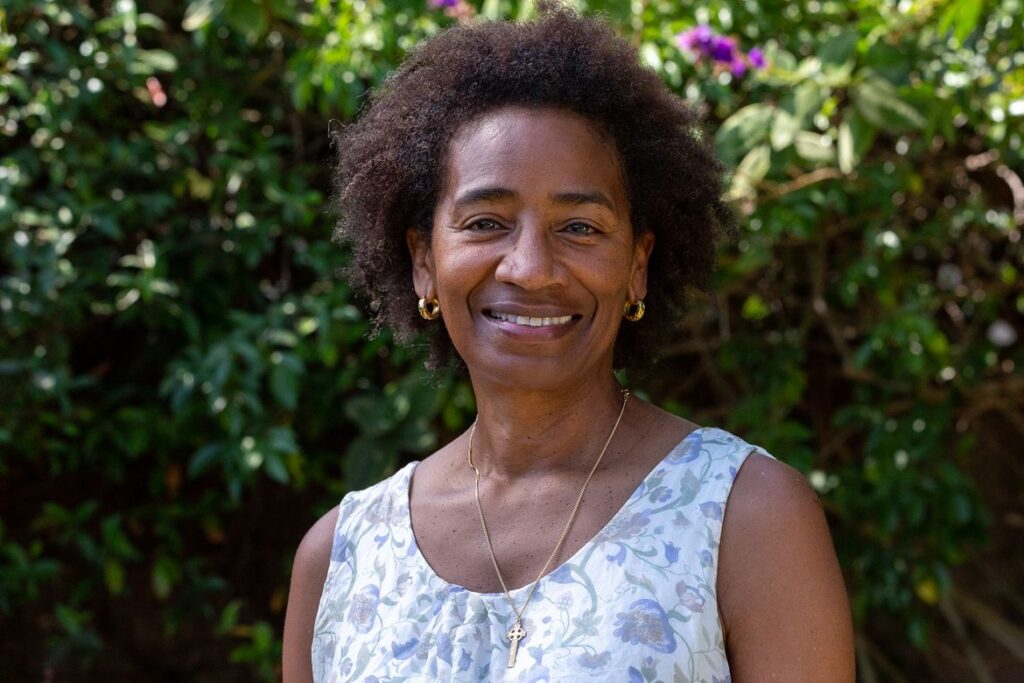
Ashley Kruythoff/UCLA
Marilyn Raphael, professor of geography within UCLA’s Division of Social Science, has been elected to the National Academy of Sciences for her achievements in original research. Raphael joins three other UCLA professors who form part of a new class of 120 members and 30 international members, the academy announced on April 29.
Membership in the academy is among the most prestigious honors in the United States scientific community, requiring election by a scholar’s peers. The nongovernmental organization now has 2,662 active members, who can be called on by the federal government to provide their expertise on issues regarding science and technology.
Raphael is a climate scientist who studies global climate change, atmospheric circulation, and the complex dynamics behind how and why Antarctica’s sea ice levels vary from season to season. Her recent research indicates that melting Antarctic Sea ice is becoming far less likely to recover, suggesting the continent’s ice system is undergoing a major transformation.
“It is a tremendous honor to be elected to the National Academy of Sciences,” she said. “I feel grateful to have my research and service be valued so highly by the community. I look forward to working with the academy to advance its mission of ‘fostering a broad understanding of science,’ especially in the Antarctic.”
Raphael is the author of more than 60 academic papers, many of them highly cited, and is the co-author of “The Encyclopedia of Weather and Climate Change: A Complete Visual Guide,” which received the Most Popular Book award from Atmospheric Science Librarians International. Her work and writing continues to shape both academic inquiry and public understanding of polar climate dynamics.
A UCLA faculty member since 1998, Raphael is the former director of the UCLA Institute of the Environment and Sustainability and the former chair of UCLA’s geography department. A past president of the American Association of Geographers and former co-chair of the Scientific Committee on Antarctic Research’s expert group on sea ice processes, Raphael serves on the National Academies Board on Atmospheric Sciences and Climate and is co-lead of the World Climate Research Programme’s Polar Climate Predictability Initiative.
In addition to her research, she has been active in mentoring students and advocating for the inclusion of traditionally underrepresented groups in climate science.
This story was adapted from an article originally published via UCLA’s Newsroom.
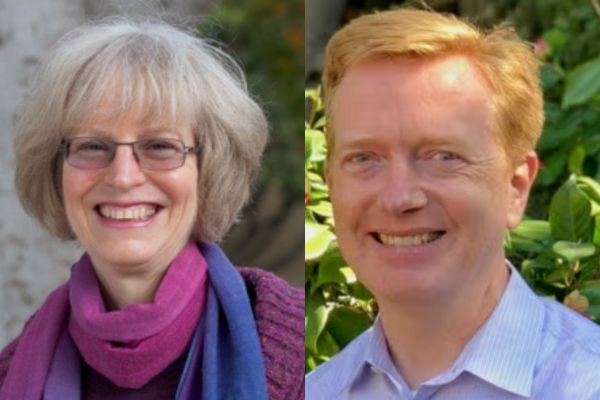
Adapted from UCLA Newsroom

Right to left: Marjorie Harness Goodwin (anthropology) and Jeffrey Lewis (political science).
Distinguished research professor of anthropology Marjorie Harness Goodwin and Professor of Political Science Jeffrey Lewis have been selected to the American Academy of Arts, one of the nation’s most prestigious honorary societies. They are among four UCLA faculty and nearly 250 artists, scholars, scientists and leaders in the public, nonprofit and private sectors chosen for membership this year.
The academy serves as an independent research center convening leaders from across disciplines, professions and perspectives to address significant challenges, with the aim of producing independent and pragmatic studies that inform national and global policy and benefit the public.
They will be inducted in October at the academy’s headquarters in Cambridge, Massachusetts.
Marjorie Harness Goodwin
Distinguished research professor of anthropology
Goodwin, a linguistic anthropologist, focuses on how language, touch and other embodied practices shape human interactions. Her work has examined how members of children’s peer groups, families and workplace groups use everyday language and communication to construct social order, express intimacy and navigate ideas about moral behavior. Through her research and influential books, including “The Hidden Life of Girls,” “He-Said-She-Said” and “Embodied Family Choreography,” Goodwin has helped advance our understanding of human social dynamics and the ways people use their language, their bodies and their emotions to manage relationships and create meaning.
Jeffrey Lewis
Professor of political science
Lewis, a political scientist, investigates foundational questions of democratic representation and develops innovative methods for analyzing political behavior. His research explores how preferences can be deduced from behavior. He is also a leading figure in political methodology, contributing tools that have reshaped how scholars study legislatures and electoral politics. As the curator of Voteview.com — a platform that provides free data and tools for analyzing roll call voting in the U.S. Congress — he helps advance public and scholarly understanding of ideological polarization and legislative behavior. Lewis has served as president of the Society for Political Methodology and as an editor of the American Political Science Review, helping to shape the direction of research in the discipline. Through his empirical rigor and public scholarship, Lewis has played a pivotal role in elevating both the accessibility and sophistication of political science research.
Read American Academy of Arts & Sciences announcement here.
Learn more via UCLA Newsroom coverage here.